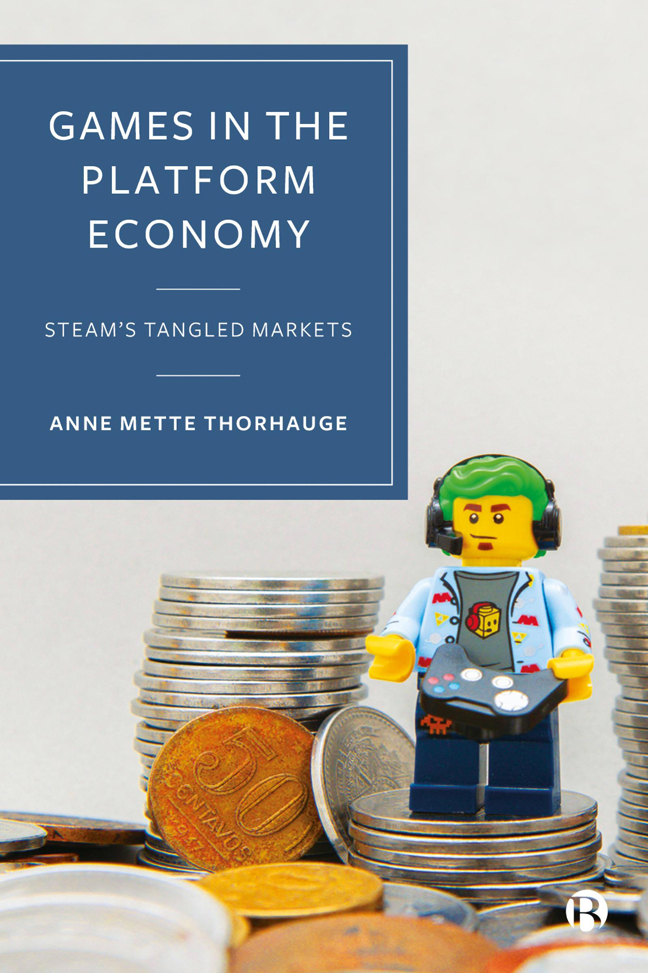Book contents
- Frontmatter
- Dedication
- Contents
- List of Figures and Table
- Acknowledgements
- 1 Introduction: Steam's Tangled Markets
- 2 Platform Configurations in Gaming
- 3 Economic Sociology and the Analysis of Platforms as Markets
- 4 Valve Corporation and the Steam Platform
- 5 Steam's Business Model
- 6 Shaping Market Interactions on the Steam Platform
- 7 Economic Actors on the Steam Platform
- 8 Player Trading beyond Steam
- 9 User Monetization and Value Creation in Tangled Markets
- Notes
- References
- Index
8 - Player Trading beyond Steam
Published online by Cambridge University Press: 23 January 2024
- Frontmatter
- Dedication
- Contents
- List of Figures and Table
- Acknowledgements
- 1 Introduction: Steam's Tangled Markets
- 2 Platform Configurations in Gaming
- 3 Economic Sociology and the Analysis of Platforms as Markets
- 4 Valve Corporation and the Steam Platform
- 5 Steam's Business Model
- 6 Shaping Market Interactions on the Steam Platform
- 7 Economic Actors on the Steam Platform
- 8 Player Trading beyond Steam
- 9 User Monetization and Value Creation in Tangled Markets
- Notes
- References
- Index
Summary
In the former chapters, I have analysed and discussed the ways in which the Steam platform has historically expanded the scope of economic transactions (Chapter 5), how this is enabled by the platform features (Chapter 6), and how different actors on the platform turn these affordances into ways of making business (Chapter 7). In this chapter, I will dive deeper into the way these economic transactions extend beyond the Steam platform on to the wider internet. My key point will be that the existence of extra-platform contexts of economic exchange not only serves to expand the number of economic transactions and grow the market, but potentially turns the Steam platform into a payment instrument and skins into a unit of transaction independent of the games from which they originate. Indeed, it can be interpreted as an attempt to create ‘money at the margins’ (Hütten and Thiemann, 2017) by transforming Steam and its extra-platform transactions into a ‘monetary network’ (Dodd, 1994). Firstly, I will characterize some of the extra-platform contexts of economic exchange and explain in what way they seem to be ‘powered by Steam’. As an extension of this, I will discuss Valve's possible motives for enabling, or at least not policing, these economic practices. These motives can to some degree be tied to the business emphases addressed in Chapter 5, that is, expanding the scope of economic transactions by enabling microtransactions on third-party websites and allowing the secondary market of game items to expand beyond the platform. However, Valve's motives can also be interpreted as an attempt to explore Steam's potential as a social-financial technology beyond its game economies. In the subsequent sections, I will discuss in more detail what this implies. On one hand, the Steam platform does not feature any blockchain technology and does not provide the opportunity of ‘mining’ for assets. In this way, we are by no means talking about a new kind of cryptocurrency system in the established sense of the word. On the other hand, the avid trading community of Steam gamers can be seen as an alternative and perhaps even more important resource for developing a local medium of exchange which allows players to trade items and engage in economic practices beyond the game economies in which these communities originate, effectively linking the Steam platform to wider economic practices on the internet.
- Type
- Chapter
- Information
- Games in the Platform EconomySteam's Tangled Markets, pp. 106 - 118Publisher: Bristol University PressPrint publication year: 2023



